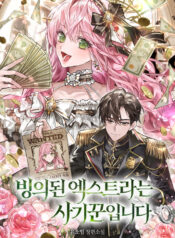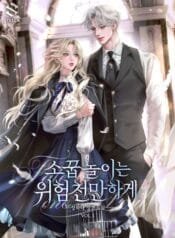Chapter 3.3
After the intermission, Olivia’s rising displeasure became uncontrollable.
The serene smile of Edgar Wharton had no connection to the tragic lovers on stage, torn apart by fate. What could possibly be amusing about such a scene?
Perhaps he was having a secret rendezvous in the dark.
Olivia glanced toward the opposite side. In the dim light, she caught sight of the person who held Edgar’s gaze.
It was a pretty face, but not one that stood out. Had she seen that light brown hair at a ball or tea party, she might not have remembered the name after a single glance.
But now, it was different.
Everything about the woman seated opposite her provoked Olivia. She bit her lips, which had twisted into a bitter smile.
“Didn’t you know?”
The thought of the pitiful expression, complete with arched brows, made her even more irritated.
Edgar Wharton, who was supposed to escort her, had been absent the entire time. Unable to wait any longer, Olivia had stepped out into the hallway alone.
“Oh my, I never expected to see you at the Flavium Theater, Miss Windsor!”
The woman who spoke so casually was someone whose name Olivia barely remembered. She must have been the daughter of some insignificant family. Olivia had intended to walk past her, but one comment stopped her in her tracks.
“Are you here with Mr. Wharton?”
Olivia read the admiration and envy in the woman’s gaze. Such looks were familiar to her.
Everything Olivia owned was always the finest. Her dolls in childhood, her debutante dress, and even her future husband would be no exception.
But the reaction that followed was unfamiliar.
“I thought Mr. Wharton had found a new lover. Did they break up after only a few days? Surely he wouldn’t be seeing two women at once.”
The frown on Olivia’s face was met with pity, not envy.
“I saw him kissing a young lady at the ball. They certainly seemed close. While it’s true that Mr. Wharton has had many women by his side…”
Sometimes, silence conveyed more than words. Olivia was stunned by the insinuation that she was just one among Edgar Wharton’s many “women.”
How dare they compare me to them? How dare they?
At that moment, a whistle echoed from the far end of the hallway. Some people clearly had no shame. Thinking this, Olivia turned her gaze and saw a woman.
“Oh my, it’s her.”
With an exaggerated gesture, she pointed toward the woman.
Though the woman disappeared behind the wall again, the light brown hair lingered vividly in Olivia’s mind.
The play finally came to an end.
Amidst the thunderous applause from the audience, Edgar Wharton clapped leisurely, his face calm and composed. Olivia let out a small, bitter laugh as she looked at his handsome face, which had deceived her. Instead of applauding the actors, she rose from her seat and gazed at Edgar Wharton, who was now looking up at her.
This man was the finest actor of all.
“I realize I didn’t make myself clear.”
Olivia said, replacing her applause with a radiant smile.
“Let’s call off the engagement.”
Edgar Wharton was beautiful. Everyone desired a beautiful man, but one night with him was enough. He was not someone to promise a lifetime to.
He was a lover everyone dreamed of but a husband no one wanted.
Thus, the upper hand in this relationship belonged to Olivia. She looked down on him, and he looked up at her, just as it should be.
He was a man who kissed another woman and shamelessly whispered love. A foolish and audacious man who failed to recognize his place.
“There’s no need to write me letters anymore. Save such embarrassing words for the one you truly care about.”
The applause from the audience began to fade. Edgar Wharton, who had been silently watching Olivia, furrowed his brows.
“There seems to be a misunderstanding.”
“A misunderstanding… Should I go to the opposite box and ask her directly?”
“……”
A flicker of unease rippled through his previously calm blue eyes. Olivia focused on that faint crack.
She stepped closer to him. His upturned gaze was as lovely as dewdrops and as deceitful as a con artist’s. She thought it wouldn’t be bad to see tears well up in those pretty eyes. Seeing him cry and beg would be quite satisfying. Olivia smiled, suppressing her irritation with this anticipation.
“In this arrangement, it’s not me who should be bowing down—it’s you. Don’t try to deceive me with that pretty head of yours. Think carefully.”
The applause ceased. Olivia, without another word, left the box, her silence serving as her farewell.
Left alone, Edgar’s view was filled with the splendor of the Flavium Theater. The audience began to leave, as if waking from a midnight dream. In the silence that replaced the applause, Lady Wharton’s voice echoed clearly in Edgar’s mind.
“Act as the owner of the Flavium Theater.”
The weight of the test he bore pressed heavily on his shoulders, leaving him unable to rise from his seat. Edgar sat there, motionless, as the audience departed, like an actor who had lost his role and had no lines left to speak.
As he looked down at the now-empty seats, Edgar noticed a figure in the opposite box.
One person remained. Like Edgar, she was gazing down at the empty audience. The young lady with light brown hair—Natalie.
With a sorrowful expression, Natalie sank into her seat, burying her face in her hands. Something seemed to be wrong. Edgar quickly rose from his seat and headed toward the opposite box.
***
To have a successful conversation, one must know the oher person’s interests.
Talking about shared interests is a good starting point for any conversation. This was a social skill Natalie had learned from reading countless books, even though she rarely met people in person.
After a brief intermission, Natalie returned to the box and had the opportunity to converse with Mr. Salinger. Their discussion revolved around the play.
Whenever Mr. Salinger mentioned an unfamiliar title, Natalie racked her brain to keep the conversation going. She was especially relieved when Shakespeare came up—a topic she knew well. For the first time, she could genuinely say, “That’s such a wonderful story,” and mean it.
“Your younger sister has an interest in theater as well, doesn’t she? I believe she’s fond of Macbeth.”
Natalie’s beloved sister, Sally, was someone she knew better than anyone else. Since Mr. Salinger also knew Sally, it was a shared interest they could discuss.
In truth, Sally wasn’t interested in theater. She preferred lively activities to sitting still, and meeting people to reading books—the complete opposite of Natalie.
“Yes, Sally loves theater.”
But it had to be true. After all, Natalie had written as much in the letter. The letter she had sent under Sally’s name.
“I was surprised when I received the letter.”
A faint smile appeared on Mr. Salinger’s lips, as if recalling the letter.
“All the world’s a stage, and all the men and women merely players…”
Hearing his words, Natalie recognized them as a line from ‘Macbeth’. She immediately continued the next part of the quote.
“They have their exits and their entrances.”
Reciting the line flawlessly, she noticed Mr. Salinger’s surprised expression.
“You know it well, Miss Maron.”
Natalie blushed under Mr. Salinger’s charming smile.
“I enjoy it.”
She said, only to realize that her words could be misunderstood. Quickly, she retracted her statement.
“I mean, I enjoy that passage.”
While Natalie flustered herself, Mr. Salinger calmly observed her.
“It must be delightful to share interests with your sister.”
“Yes, it’s truly wonderful.”
Natalie, her ears turning red, replied with whatever came to mind. Their conversation was interrupted as the curtain rose again.
Natalie soon became fully engrossed in the play. She even found herself tearing up at the tragic fate of the star-crossed lovers. When the curtain fell, she was still lost in the afterglow, clapping with all her heart.
As the wave of applause spread through the audience, Mr. Salinger asked,
“What did you think?”
“It was wonderful.”
Natalie replied, struggling to sum up her emotions in just one word. But the applause stirred her heart too much for her to stop there.
“The actors are truly amazing. They turn that small stage into a vast, living world. They make people laugh, cry, and glimpse life itself. It’s truly remarkable.”
Before she could ramble on, Natalie stopped herself and instead offered a gentle smile—the kind she had learned from Mr. Wharton.
“That’s true.”
Mr. Salinger replied, though his tone was ambiguous. With a serious expression, he continued.
“But today’s performance was somewhat lacking. It was too exaggerated—the tone of the lines, the expressions. In trying to hide their lack of skill, they only appeared more clumsy.”
This time, Natalie couldn’t agree with him. Mr. Salinger’s critical evaluation made her feel embarrassed for having been so moved by the play.
The awkward smile she had practiced with Mr. Wharton faded quietly from her face. What completely erased her smile was Mr. Salinger’s next comment.
“I wonder what your sister would have thought of it.”
To Natalie, it sounded like he regretted that Sally wasn’t there instead of her. The courage she had mustered upon entering the theater vanished like a flame doused with water.
Shared interests. Her beloved sister, Sally.
She recalled how frequently Mr. Salinger had mentioned Sally.
Your sister.
Natalie looked down at her clasped hands, a sinking feeling taking hold of her.
“By any chance…”
She couldn’t complete her sentence. Instead, she bit her lip and looked at Mr. Salinger with tear-filled eyes—eyes still wet from the play’s emotions.
“Do you… like Sally?”
Amidst the noisy applause of the audience, silence enveloped Natalie and Mr. Salinger.







